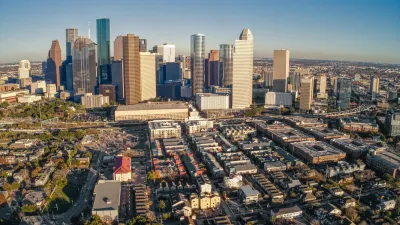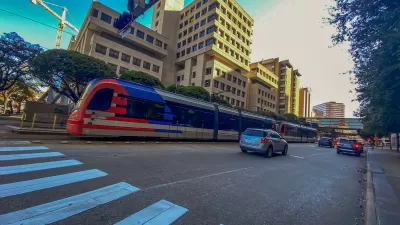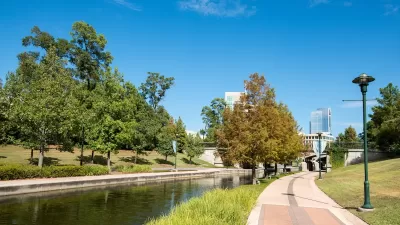A movement to change how the regional planning council operates could give the city of Houston more power in decisionmaking.

The Houston-Galveston Area Council (H-GAC) could “rethink how it balances the interests of the urban core with that of the suburbs and rural areas,” writes Muizz Akhtar in a brief for the Kinder Institute for Urban Research’s Urban Edge.
A petition gaining strength in Houston would change the structure of H-GAC to prevent instances where Houston, “the beating heart of the region” according to Fair for Houston organizer Molly Cook, is outvoted by the largely suburban board.
Akhtar explains how regional planning and collaboration was standardized in the 1950s and 1960s, and the conflicts that occur as local governments fight for resources and funding. The debate centers on how much power each local member holds in decisions and funding allocations. According to the brief, “the City of Houston and unincorporated parts of Harris County, which make up more than 57% of the population, have only 11% of the board’s votes, according to a recent analysis by January Advisors, a data science consulting firm based in Houston.”
If the petition, launched by Fair for Houston, gets on the ballot and passes, it would change the structure of H-GAC to give Houston proportional representation or require the city to withdraw from the organization. “While most regional governmental bodies in the US are not proportional, there are a few models, such as the regional council in the Seattle metropolitan area or the association of governments that covers the Phoenix area, which has a system that gives each member one vote based on population and another based on jurisdiction.”
FULL STORY: Highways, flooding and sprawl: How Houston could have a bigger say in the region's future

Manufactured Crisis: Losing the Nation’s Largest Source of Unsubsidized Affordable Housing
Manufactured housing communities have long been an affordable housing option for millions of people living in the U.S., but that affordability is disappearing rapidly. How did we get here?

Americans May Be Stuck — But Why?
Americans are moving a lot less than they once did, and that is a problem. While Yoni Applebaum, in his highly-publicized article Stuck, gets the reasons badly wrong, it's still important to ask: why are we moving so much less than before?

Research Shows More Roads = More Driving
A national study shows, once again, that increasing road supply induces additional vehicle travel, particularly over the long run.

Using Old Oil and Gas Wells for Green Energy Storage
Penn State researchers have found that repurposing abandoned oil and gas wells for geothermal-assisted compressed-air energy storage can boost efficiency, reduce environmental risks, and support clean energy and job transitions.

How Protecting Kauaʻi’s Forests Safeguards Fresh Water
A University of Hawaiʻi study shows that protecting Kauaʻi’s native forests from invasive species significantly boosts groundwater recharge, making it a cost-effective strategy to secure fresh water and enhance climate resilience.

Gary, Indiana to Expand Transit Service, Bike Share
The city plans to launch a bike share system in April and expand service on its bus routes.
Urban Design for Planners 1: Software Tools
This six-course series explores essential urban design concepts using open source software and equips planners with the tools they need to participate fully in the urban design process.
Planning for Universal Design
Learn the tools for implementing Universal Design in planning regulations.
City of Moreno Valley
Institute for Housing and Urban Development Studies (IHS)
City of Grandview
Harvard GSD Executive Education
NYU Wagner Graduate School of Public Service
City of Cambridge, Maryland
Newport County Development Council: Connect Greater Newport





























